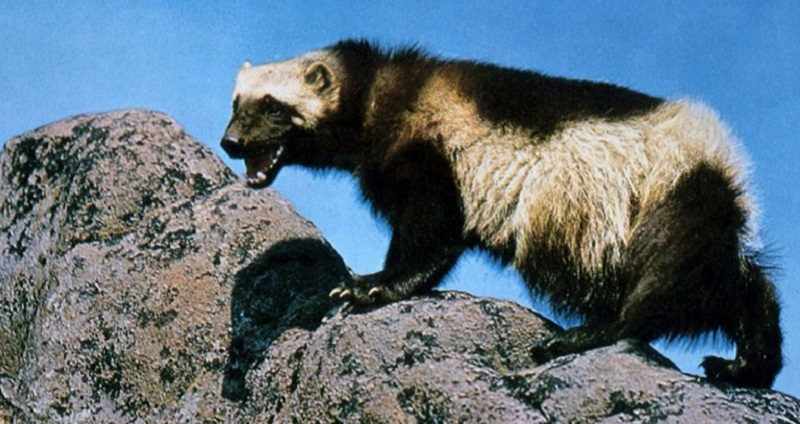I’m interested these days in the relationship between human beings and other animals, how we fit into the fabric of nature, how we managed to get from a mediocre position in the food chain to top spot, and what we have done with that position.
Today I was thinking about two traits that seem to me distinctively human and wondered if I could disprove that theory or if they are indeed defining traits: greed and wastefulness. I found this very interesting article on wolverines that suggests greed, at least, is not limited to human beings: “Wolverines Give Insight Into The Evolution of Greed.”
I can find nothing about wastefulness among other animals, although there’s plenty about the appalling 30-40% waste in the human world. I imagine this either means that no one has researched this particular issue — or that there’s nothing to research, that is, animals don’t typically waste. If anyone finds an article or a report on some research, I’d appreciate knowing about it. You can email me at leslie@vegetatingwithleslie.org or share to my Facebook page.
On the theme of more desirable traits, Sierra Club featured this beautiful article in their March / April 2019 issue: “Does A Bear Think In The Woods?”
A side note: in the past five years, there have been more than 190,000 publications about various aspects of animal intelligence.

I’m just relating 2 things I have experienced in my ‘life on 5 acres’. When a mink or ermine gets into a pigeon shelter, they will go around and take a bite in the neck vein of the birds and leave them there, not taking any ! …..Some little animal, chipmunk, etc. will take 1 bite out of each ripe tomato on the vine and then not eat them. Seems pretty wasteful to me. I know this is just in my little corner of the world, but there is a much bigger picture to take a look at….
Thank you, Barbara! Just what I’m looking for. Anecdotes – research – articles. So maybe that, too, is a shared trait. And that makes me wonder about the evolutionary purpose of it.
I had a landlord years ago who always planted two extra rows of corn for the raccoons. Inevitably, of course, they ravished the entire planting. What was interesting, and inflamed my landlord, was that they would take one or two bites out of each ear and move on to the next ear. They could pretty much destroy the entire crop in one night. Was this wastefulness or were they gourmands who would only eat the sweetest kernels?
Yes, I quickly found the answer to my question about greed and wastefulness in animals when I read Not So Different. I’m going to read that book again. I wish I could remember details better — but I think the sum of what Lents says there is that there is little difference between humans and non-human animals. We all have the same biological drives, just expressed in different ways for different situations. I would guess that he would say the raccoons destroyed everything they didn’t eat themselves not out of waste or greed, though it looks like either one or both, but out of the evolutionary drive to prevent others from competing with them on the food chain.
I have a funny story about raccoons. I used to own a farm in Galena. 45 years ago I put in a very large organic garden and orchard out there. When I was chatting with the farmer we bought the land from, picking his brain, he said, among other things, that all night before he planned to pick his corn, he would sit out with his shotgun to keep the raccoons away. Vegetarian me was shocked. I planted my corn along with everything else, and it grew beautifully, no problems. I thought to myself, tomorrow I’ll pick the corn. Not. The next morning, the entire section was destroyed. I read every issue of my Organic Gardening and Farming magazine from cover to cover looking for solutions to various issues, and this issue was #1. I wanted that corn. In following years I tried everything. After four or five years, I was beginning to understand the farmer’s solution. Either he was going to eat or the raccoon was — and he made a decision for his own survival. In desperation I tried one last thing: planting cucumbers between the rows of corn. And guess what? It worked. The raccoons didn’t like walking through those prickly stems — so I got beautiful corn and cucumbers that year, and the raccoons got to live and be happy — somewhere else.